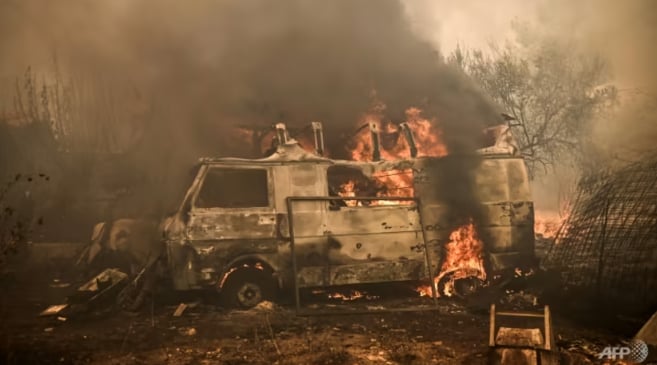November 27, 2025 | 23:47 GMT +7
November 27, 2025 | 23:47 GMT +7
Hotline: 0913.378.918
November 27, 2025 | 23:47 GMT +7
Hotline: 0913.378.918

Wildfires in Greece ravaged Acharnes, north of Athens. Photo: AFP/Angelos Tzortzinis
Scientists at the Breakthrough Institute, a non-profit research centre, found that human-caused warming increased the frequency of "extreme" wildfires by 25 per cent on average compared to the pre-industrial era, in a study in the journal Nature.v
Examining a series of blazes from 2003 to 2020, they used machine learning to analyse the link between higher average temperatures, dryer conditions and the fastest-spreading blazes - ones that burn more than 10,000 acres (4,000 hectares) a day.
The impact of climate change varied from fire to fire.
In certain partly dry conditions, global warming pushed the area beyond key thresholds, making extreme fires much more likely. In very dry conditions, the impact was less.
"This means that we should pay the closest attention to the places and times that historically have experienced conditions just on the moist side of these thresholds, but which are being pushed over these thresholds onto the dry side by background warming," lead author Patrick Brown told AFP.
The researchers calculated that the risk could increase on average by 59 per cent by the end of the century under a "low-emissions" scenario where global warming is limited to 1.8 degrees Celsius above preindustrial levels, and up to 172 per cent in an unbridled high-emissions scenario.
Earth's surface has already warmed 1.2 degrees Celsius.
Using data from recorded fires, the researchers measured the probability of a given blaze turning into an "extreme" one. Then they used computer models to calculate how far the post-industrial rise in temperatures had increased that risk.
The study controlled for variables such as precipitation, wind and absolute humidity and the researchers warned that changes in these could make the risk from global warming even worse.
California has suffered a string of extreme wildfires in recent years.
In 2020, more than 30 people died and four million acres were devoured by flames in some of the biggest fires in the state's history. The November 2018 "Camp Fire" killed 86 people.
The study's publication followed a summer of wildfires that killed at least 115 people in Hawaii and forced 200,000 from their homes in Canada.
Greece is battling what EU officials called the bloc's biggest wildfire on record along a 10-kilometre front. It has killed 20 people.
A 2022 United Nations Environment Programme report on wildfires said they are becoming more common due to hotter, dryer conditions caused by climate change, including in regions not traditionally prone to them.
Nature study author Brown said the insights into dryness thresholds could aid prevention measures, for example by indicating the best spots for thinning and prescribed burning of vegetation to reduce the dry natural matter that wildfires feed on, known as "hazardous fuel".
"We are finding that under most conditions, the impact of hazardous fuel reductions can completely negate the impact of climate change," he said.
"It is plausible to have a future of much less wildfire danger despite climate change if we conduct these fuel treatments at scale."
He said the findings could also inform precautions regarding power lines and indicate where monitoring and awareness campaigns should be focused, and firefighting resources deployed.
Other wildfire experts said awareness of fire risks will become increasingly important for authorities and even holidaymakers.
In a separate briefing by wildfire specialists on Wednesday not related to the study, Andrew Sullivan of Australia's national science agency CSIRO said expenditure was typically "skewed" towards responding to wildfires with not enough money allocated for preventing them.
He said there was a "global need to rebalance expenditure to improve risk mitigation" measures such as managing vegetation and fire-danger forecasting.
(AFP)

(VAN) A new study reveals how the simultaneous effects of ocean acidification, salinity and loss of oxygen are making the world more fragile.

(VAN) Hopes are growing that the creation of the first 3D turkey gut model could be a turning point in the battle against the virulent blackhead disease.

(VAN) Tyson, America’s biggest meat supplier, plans to shutter one of its largest beef processing plants as the industry continues to struggle with low cattle supplies and political pressure from Washington.

(VAN) New FAO study shows how digital solutions are empowering farmers and fishers to prevent losses and build resilient agrifood systems.

(VAN) Brazil's COP30 presidency pushed through a compromise climate deal on Saturday that would boost finance for poor nations coping with global warming but that omitted any mention of the fossil fuels driving it.

(VAN) Poultry farmers in the UK have been warned that they could face one of the worst winters yet for bird flu.

(VAN) Prices of main-crop paddy have risen sharply, with jasmine rice hitting 16,100 baht per tonne — the highest level in years.